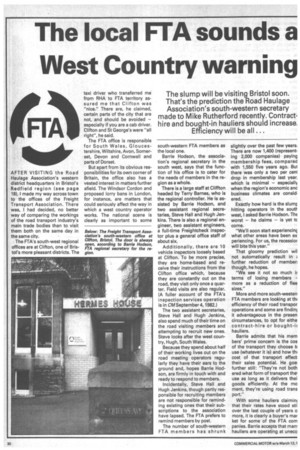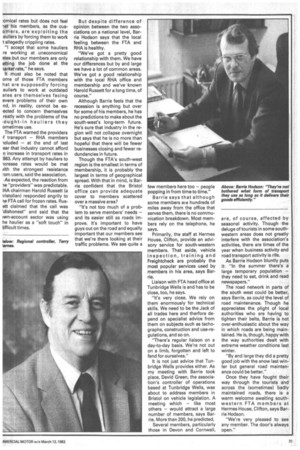The local FTA sounds a West Country warning
Page 32

Page 33

If you've noticed an error in this article please click here to report it so we can fix it.
AFTER VISITING the Road Haulage Association's western district headquarters in Bristol's Redfield region (see page 18), I made my way across town to the offices of the Freight Transport Association. There was, I had decided, no better way of comparing the workings of the road transport industry's main trade bodies than to visit them both on the same day in the same city.
The ETA's south-west regional offices are at Clifton, one of Bristol's more pleasant districts. The taxi driver who transferred me' from RHA to FTA territory assured me that Clifton was "nice." There are, he claimed, certain parts of the city that are not, and should be avoided — especially if you are a cab driver. Clifton and St George's were "all right", he said.
The FTA office is responsible for South Wales, Gloucestershire, Wiltshire, Avon, Somerset, Devon and Cornwall and parts of Dorset.
But apart from its obvious responsibilities for its own corner of Britain, the office also has a vested interest in matters further afield. The Windsor Cordon and proposed lorry bans in London, for instance, are matters that could seriously affect the way in which a west country operator works. The national scene is clearly as important to some south-western FTA members as the local one.
Barrie Hodson, the association's regional secretary in the south west, says that the function of his office is to cater for the needs of members in the region as a whole.
There is a large staff at Cliffton headed by Terry Barnes, who is the regional controller. He is assisted by Barrie Hodson, and two assistant regional secretaries, Steve Hall and Hugh Jenkins. There is also a regional engineer, two assistant engineers, a full-time Freightcheck inspector plus a general office staff of about six.
Additionally, there are 10 vehicle inspectors loosely based at Clifton. To be more precise, they are home-based and receive their instructions from the Clifton office which, because they are constantly out on the road, they visit only once a quarter. Field visits are also regular. (A fuller account of the ETA's inspection services operation is in CM September 4, 1982.)
The two assistant secretaries, Steve Hall and Hugh Jenkins, also spend much of their time on the road visiting members and attempting to recruit new ones. Steve looks after the west country, Hugh, South Wales.
Because they spend about half of their working lives out on the road meeting operators regularly they have their ears to the ground and, hopes Barrie Hodson, are firmly in touch with and ready to respond to members.
Incidentally, Steve Hall and Hugh Jenkins, though partly responsible for recruiting members are not responsible for reminding existing ones that their subscriptions to the association have lapsed. The FTA prefers to remind members by post.
The number of south-western FTA members has shrunk slightly over the past few years. There are now 1,400 (representing 2,000 companies) paying membership fees, compared with 1,550 five years ago. Bul there was only a two per cen1 drop in membership last year, which is minimal — especially when the region's economic and business climates are consid. ered.
Exactly how hard is the slumr hitting operators in the south west, I asked Barrie Hodson. ThE worst — he claims — is yet tc come.
"We'll soon start experiencinc what other areas have been ex periencing. For us, the recessior will bite this year."
That gloomy prediction wil not automatically result in r further reduction of member: though, he hopes.
"We see it not so much ir terms of losing members more as a reduction of flee sizes."
More and more south-westerr FTA members are looking at thi efficiency of their road transpor operations and some are findirm it advantageous in the presen circumstances, to opt for eithe contract-hire or bought-ii hauliers.
Barrie admits that his mem bers' prime concern is the cos of the transport they choose tr use (whatever it is) and how thi cost of that transport effect their sales potential. He goe: further still: "They're not both ered what form of transport the' use as long as it delivers thei goods efficiently. At the mo ment, they're using road trans port."
With some hauliers claimini that their rates have stood stil over the last couple of years o more, it is clearly a buyer's mar ket for some of the FTA corn panies. Barrie accepts that man+ hauliers are operating at uneco ornical rates but does not feel at his members, as the cusome rs, are exploiting the auliers by forcing them to work t allegedly crippling rates.
"I accept that some hauliers re working at uneconomical ates but our members are only etting the job done at the larket rate," he says.
It must also be noted that ome of those FTA members hat are supposedly forcing auliers to work at outdated ates are themselves facing evere problems of their own nd, in reality, cannot be exected to concern themselves reatly with the problems of the lought-in hauliers they ometimes use.
The FTA warned the providers If transport — RHA members icluded — at the end of last ear that industry cannot afford n increase in transport rates in 983. Any attempt by hauliers to icrease rates would be met iith the strongest resistance -om users, said the association. As expected, the reaction from le "providers" was predictable. IHA chairman Harold Russett (a Iristolian) responded angrily to ie FTA call for frozen rates. Rusett claimed that the call was 'dishonest" and said that the )wn-account sector was using he haulier as a "soft touch" in lifficult times. But despite difference of opinion between the two associations on a national level, Barrie Hodson says that the local feeling between the FTA and RHA is healthy.
"We've got a pretty good relationship with them. We have our differences but by and large we have a lot of common areas. We've got a good relationship with the local RHA office and membership and we've 'known Harold Russett for a long time, of course."
Although Barrie feels that the recession is anything but over for some of his members, he has no predictions to make about the south-west's long-term future. He's sure that industry in the region will not collapse overnight but says that he is no more than hopeful that there will be fewer businesses closing and fewer redundancies in future.
Though the ETA's south-west region is the smallest in terms of membership, it is probably the largest in terms of geographical spread. With that in mind, is Barrie confident that the Bristol office can provide adequate cover to members scattered over a massive area?
"It's not too much of a problem to serve members' needs — and its easier still as roads improve. It's important to have guys out on the road and equally important that our members see that we're there looking at their traffic problems. We see quite a few members here too — people popping in from time to time."
Barrie says that although some members are hundreds of miles away from the office that serves them, there is no communication breakdown. Most members rely on the telephone, he says.
Primarily, the staff at Hermes House, Clifton, provide an advisory service for south-western members. That aside, vehicle inspection, training and Freightcheck are probably the most popular services used by members in his area, says Barrie.
Liaison with FTA head office at Tunbridge Wells is and has to be close, too, he says.
"It's very close. We rely on them enormously for technical skills. We need to be the Jack of all trades here and therfore depend on specialist advice from them on subjects such as tachographs, construction and use-regulations, and so on.
"There's regular liaison on a day-to-day basis. We're not out on a limb, forgotten and left to fend for ourselves."
It is not just advice that Tunbridge Wells provides either. As my meeting with Barrie took place, David Green, the association's controller of operations based at Tunbridge Wells, was about to address members in Bristol on vehicle legislation. A meeting which — like most others — would attract a large number of members, says Barrie. More than 200, he predicted.
Several members, particularly those in Devon and Cornwall, are, of course, affected by seasonal activity. Though the deluge of tourists in some southwestern areas does not greatly interfere with the association's activities, there are times of the year when business activity and road transport activity is rife.
As Barrie Hodson bluntly puts it: "In the summer there's a large temporary population — they need to eat, drink and read newspapers."
The road network in parts of the south west could be better, says Barrie, as could the level of road maintenance. Though he appreciates the plight of local authorities who are having to tighten their belts, Barrie is not over-enthusiastic about the way in which roads are being maintained. He is, though, happy with the way authorities dealt with extreme weather conditions last winter.
"By and large they did a pretty good job with the snow last winter but general road maintenance could be better."
Once they have fought their way through the tourists and across the (sometimes) badly maintained roads, there is a warm welcome awaiting southwestern FTA members at Hermes House, Clifton, says Barrie Hodson.
"We're very pleased to see any member. The door's always open."




























































































